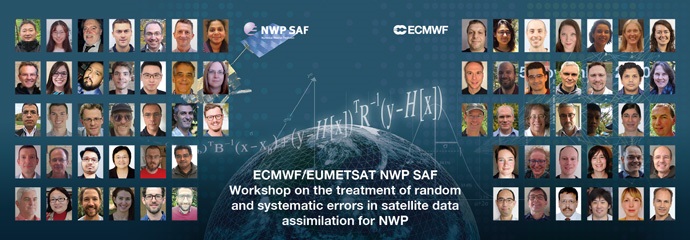Workshop description
Dealing with random and systematic errors in observations and models is at the heart of satellite data assimilation for Numerical Weather Prediction (NWP). This workshop captured recent progress and the state of the art in this area, identified key issues and limitations, and discussed avenues for further developments. It was organised in collaboration with the EUMETSAT NWP SAF.
The workshop covered the following main themes:
1) Estimating uncertainties
Knowledge about observational and model errors and uncertainties informs our treatment of these in the assimilation. This theme covered recent activities ranging from thorough characterisation of satellite instruments, better estimation and modelling of other error contributions (such as radiative transfer/observation operator errors or other representation errors), the use of reference observations, to advances in diagnostic methods.
2) Correction of observational and model biases in data assimilation
Correction of observational biases is essential for the successful assimilation of many satellite observations. Adaptive bias correction methods are now commonly used, but separation of observation and forecast model biases continues to be challenging. This is particularly true in our present era with an ever increasing number of observations needing bias correction, but also in systems with highly variable observational coverage such as reanalysis. In addition, estimation of model bias during the assimilation is also becoming a reality, further probing our ability to separate different sources of errors and biases. This theme covered practical experiences with these issues, including approaches to introduce further prior knowledge to constrain or aid the separation of different sources of bias.
3) Representing observation errors in data assimilation
The description of the random component of observation error is key to optimising the impact of any observation, and this area has seen considerable progress in recent years. Many satellite observations are strongly affected by representation error, and this is often situation-dependent and correlated between different observations. This is now increasingly taken explicitly into account, with the treatment of inter-channel error correlations for satellite radiances, for instance, becoming wide-spread. The treatment of spatially and temporally correlated observation errors is also emerging. This poses questions not only in terms of how to estimate and specify such correlations, but also how to account for them in a computationally affordable way. This theme covered recent advances in the more complete specification of observation errors, including technical as well as conceptual challenges.
While the primary application focus of the workshop was Numerical Weather Prediction (NWP), the way in which these issues impact climate re-analyses based on NWP systems were also be examined.
Workshop aims
The aim of this workshop was to capture the state of the art in the treatment of random and systematic errors in satellite data assimilation for NWP, to identify key issues and limitations, and to identify avenues for further progress. Recent developments and open issues were covered through oral and poster presentations, and targeted working groups were established to identify and recommend future research needs. The output will be in the form of working group reports, identifying key recommendations for NWP centres.

